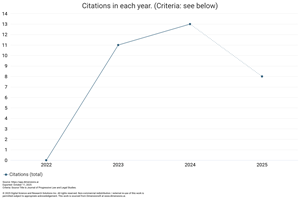Digital Transformation and Business Competition Challenges Comparative Analysis of Antitrust Law
DOI:
https://doi.org/10.59653/jplls.v2i03.877Keywords:
Digital Transformation, Business Competition, Antitrust LawAbstract
Digital transformation has changed the business competition paradigm by enabling the growth of the digital economic industry. However, this also creates new problems related to market domination by large companies and restrictions on access to platforms, making market penetration difficult for small and medium businesses. The antitrust legal framework in Indonesia needs to be strengthened to face the challenges of globalization and digital transformation. Implementation of Law Number 5 of 1999 still faces obstacles in dealing with monopolistic practices and abuse of dominant positions by large companies. Therefore, revisions or additions to more specific regulations are needed. Business competition in the digital economy is characterized by unequal access and abuse of market power by large technology companies, hindering innovation and creating injustice. Concrete steps are needed to improve the fairness of business competition, including increased regulation and more effective law enforcement. This research uses descriptive normative legal research methods to analyze the implementation of antitrust law in facing challenges arising from digital transformation. By focusing on the description and analysis of legal norms relating to business competition, this research explores how these norms are interpreted and applied in everyday legal practice. Antitrust law in Indonesia needs to be adapted to the realities of the digital economy to ensure optimal protection against business competition. This includes increasing the capacity of business competition supervisory institutions, expanding the scope of regulations to cover online platforms, and increasing sanctions for violators. Thus, it is hoped that this adjustment can provide more effective protection for small and medium businesses and encourage innovation in the digital economy sector.
Downloads
References
Anisah, S. M. (2022). Comparative Study Application Of Extra-Territorial Jurisdiction In Competition Law Between Indonesia And Us Anti-Trust Law. Int. In Journal of Law, Environment, and Natural Resources (INJURLENS) (Vol. 2, Issue 1).
Ardiansyah, D., Muharram, N. I., Utama, R. S., Bukhori, R. A., Bagus, R., Efendi, P., & Mustaqim, D. (2024). REGULASI INDUSTRI DALAM ERA GLOBALISASI: PERAN HUKUM DALAM MEWUJUDKAN EKONOMI YANG BERKELANJUTAN DAN ADIL. Jurnal Hukum Dan Kewarganegaraan, 2(2). https://doi.org/10.3783/causa.v1i1.571
Arslan, M. (2023). Legal diffusion as protectionism: the case of the U.S. promotion of antitrust laws. Review of International Political Economy, 30(6). https://doi.org/10.1080/09692290.2022.2158118
Asmah, A., & Rompegading, M. (2024). A New Mode of MSME Empowerment Creating a Strong Indonesian Economy (Perspective on Business Competition Law). Journal of Progressive Law and Legal Studies, 2(02). https://doi.org/10.59653/jplls.v2i02.710
Cho, S. J., Chung, C. Y., & Kim, D. S. (2023). Do antitrust laws erode shareholder returns? Evidence from the Chinese market. European Journal of Law and Economics, 55(2). https://doi.org/10.1007/s10657-023-09763-y
Chung, C. Y., Hasan, I., Hwang, J. H., & Kim, I. (2023). The Effects of Antitrust Laws on Horizontal Mergers: International Evidence. Journal of Financial and Quantitative Analysis. https://doi.org/10.1017/S0022109023000467
Ding, N., & Bagchi-Sen, S. (2019). An Analysis of Commuting Distance and Job Accessibility for Residents in a U.S. Legacy City. Annals of the American Association of Geographers, 109(5), 1560–1582. https://doi.org/10.1080/24694452.2019.1580133
Hariningsih. (2013). antitrus law. Unes.
Jakob, H. (2023). The Super League, the European Sports Model and antitrust law. International Sports Law Journal, 23(2). https://doi.org/10.1007/s40318-023-00244-7
Mardhiyah, A. (n.d.). Jurnal Bisnis dan Manajemen Persaingan Usaha Warung Tradisional dengan Toko Modern. http://jurnal.unmer.ac.id/index.php/jbm/index
Mulyadi, H. D., Dan, M. H., Rusydi, I., & Pd, M. I. (n.d.). Efektivitas Peran Komisi Pengawas Persaingan Usaha (KPPU) Dalam Penanganan Kasus Persaingan Usaha Tidak Sehat.
Muslimah, M., & Kartikawati, D. R. (2022). ANALISIS AKTA WASIAT YANG TIDAK DIKETAHUI OLEH AHLI WARIS BERDASARKAN HUKUM WARIS PERDATA. In Jurnal Krisna Law (Vol. 4, Issue 1). http://jurnal.unissula.ac.id/index.php/akta/article/viewFile/2520/1882.
Namira Marchellia, S. (2021). Penggunaan Antitrust Immunity dan Kartel di Masa Pandemi (Vol. 1, Issue 1).
Ochtorina Susanti, D. (n.d.). ANTITRUST LAW : SALAH SATU BENTUK KONTROL DALAM UPAYA MENCIPTAKAN DUNIA USAHA YANG SEHAT DAN BERADAP (Perbandingan Lahirnya Antitrust Law di Amerika dan Indonesia ). www.google.com,
Rose, N. L. (n.d.). Economic regulation and its reform : what have we learned?
Sujono, I., Mangesti, Y. A., & Suhartono, S. (2022). THE SELLER’S LIABILITY DUE HIDDEN DEFECTIVE PRODUCTS IN THE ONLINE SELLING AND BUYING TRANSACTION BASE ON UUPK. International Journal of Law Reconstruction, 6(2), 257–277.
Sujono, I., & Nugroho, M. (2023). Omnibus Law as Investment Law Reform in Indonesia Based on the Hierarchy of Legislation Principles. Journal of Progressive Law and Legal Studies, 1(02), 47–65. https://doi.org/10.59653/jplls.v1i02.28
Studi Hukum, P., Doktor, P., & Wahyu Dwi Nugrahaeni, A. (2019). Penerbit: Tantangan dan Pengaturan Price Discrimination: Studi Komparatif Indonesia dan Malaysia.
Vesala, J. (2023). Developing Artificial Intelligence-Based Content Creation: Are EU Copyright and Antitrust Law Fit for Purpose? IIC International Review of Intellectual Property and Competition Law, 54(3). https://doi.org/10.1007/s40319-023-01301-2
Downloads
Published
How to Cite
Issue
Section
License
Copyright (c) 2024 Dwi Ratna Kartikawati

This work is licensed under a Creative Commons Attribution-ShareAlike 4.0 International License.
Authors who publish with this journal agree to the following terms:
- Authors retain copyright and grant the journal right of first publication with the work simultaneously licensed under a Creative Commons Attribution-ShareAlike that allows others to share the work with an acknowledgement of the work's authorship and initial publication in this journal.
- Authors are able to enter into separate, additional contractual arrangements for the non-exclusive distribution of the journal's published version of the work (e.g., post it to an institutional repository or publish it in a book), with an acknowledgement of its initial publication in this journal.
- Authors are permitted and encouraged to post their work online (e.g., in institutional repositories or on their website) prior to and during the submission process, as it can lead to productive exchanges, as well as earlier and greater citation of published work (See The Effect of Open Access).
























